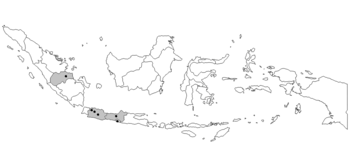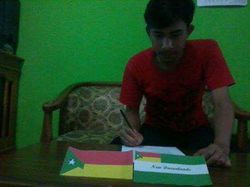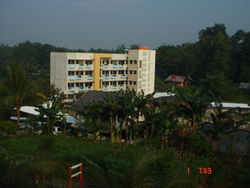Federal State of Indokistan
Federal State of Indokistan Negara Federal Indokistan | |
|---|---|
| Motto: Bersatu, Berjaya, Berdaulat United, Victorious, Sovereign | |
| Anthem: Berjayalah Indokistan Be Glorious, Indokistan[1] | |
 Map indicating locations of Indokistan | |
| Location | Java and Sumatra, Indonesia |
| Capital and largest city | Suwarnakarta |
| Official languages | Bahasa Indonesia |
| Recognised regional languages | Javanese Sundanese |
| Religion | Islam (100%) |
| Demonym(s) | Indokistani |
| Government | Federal presidential direct democratic republic |
| Farhan Abbas (last) | |
| Legislature | National Forum |
| Establishment | |
• Declared | 16 September 2010 |
• Federated | 5 July 2013 |
| 5 July 2016 | |
| Population | |
• 2016 estimate | 34 |
| Currency | Indokistani KistanRupiah (IKR) |
| Time zone | UTC+7 (UTC) |
| Driving side | left |
| Calling code | +62 |
- Term "Indokistan" redirects to the last form of the country here. For other entities known by name "Indokistan", open Indokistan (disambiguation)
Indokistan, officially the Federal State of Indokistan (Indonesian: Negara Federal Indokistan), was a micronation existed from 2010 to 2016 in Java and Sumatra islands in Indonesia. The country was considered a political simulation by its citizens and outsiders.
Founded as Republic of Indokistan on 16 September 2010, the country experienced various historical phases culminating in the establishment of the Federal State on 5 July 2013, which itself was the ultimate phase of the Indokistani statehood movement ended in the country's disbandment on 5 July 2016.
Indokistan was a federal republic based on presidential system and a distinct form of direct democracy with central government based in the federal capital of Suwarnakarta. Throughout its history, Indokistan experimented on other forms of government, such as unitary state during the Republic of Indokistan era and attempted confederation through Indonovia in 2013. Farhan Abbas was the last president of Indokistan, elected in 2014.
Indokistan was gifted by a rich culture influenced by various ethnic groups in Indonesia, with some aspects were originally invented by its citizens, which was called Indokistanis.
The micronation had a strong influence in intermicronational diplomacy, particularly within the Indonesian micronational community. Indokistan was the founding member of Association of Indonesian Micronations and Micronational Association of Southeast Asia, and was part of various intermicronational organisations, such as the Grand Unified Micronational in 2014 and the Micronational Cartography Society from 2011 to 2015-end.
Etymology
The micronational project was initially named "Indostan" -- also the name for the Indian Peninsula -- before its founders settled to "Indokistan" name shortly before declaring its foundation in 16 September 2010. Indokistan name was written for the first time to refer to a micronation in the Declaration of Establishment, handwritten by Mustafa Hakim and co-signed by Farhan Abbas and Dicky L. K..
Indokistani founders had no particular reason to name the micronation as "Indokistan" other than it sounded good and was a convincing name for a country. However, "Indokistan" name can be reconstructed as a combination of two words: "Indo-", referring to Indonesia, and suffix "-stan", a suffix of Persian language meaning "a place abounding in"; infix "-ki-" has no particular meaning other than to make the country name sounded more euphonic.
By reconstructing the name, "Indokistan" name meaning can be interpreted as "the land of Indonesians". [2] However, Indokistani residents insisted that the "Indonesia" part in the name referred only to the macronational origin of its citizens, with no intention to refer to Indonesia's political and social system whatsoever. A controversy once occurred during the presidency of Tian Abdurrahman in 2013, when he attempted to justify the micronation's name origin to enforce "Indonesianisation" policy aimed to implant Indonesia's political system to Indokistan.
An investigation conducted by some citizens in 2013 revealed that some Indonesian liberals ans secular activists used "Indokistan" word to criticise over-zealous Muslim conservatives. The word was used to ridicule the conservatives who they perceived attempted to turn Indonesia as an Islamic country or "Indokistan" -- referring to some Muslim countries with "-stan" ending in their names. Some citizens asserted that the description was misleading as the micronation stood on secular and liberal foundation throughout its existence.
History

Earlier incarnations
Indokistani Declaration of Establishment handwritten by Mustafa Hakim and co-signed by Farhan Abbas and Dicky L. K. in 16 September 2010 started Indokistan's micronational movement through its first micronational incarnation, the Republic of Indokistan, later dubbed as Indokistani First Republic for historiography purposes.[3] The First Republic was short-lived, as a coup in December 2010 ushered in the Socialist Republic of Indokistan. However, a counter-coup in January 2011 resulted in the restoration of the Republic of Indokistan, later dubbed as Indokistani Second Republic.
Following the first interaction with the MicroWiki community in February 2011, Indokistan entered the "real world of micronationalism" and its citizens began to recognise Indokistan as such. Parties opposing Indokistan challenged the micronation's very existence during the Indokistan-Ntolian War in March 2011 and was followed by Nameless Betrayal, which destroyed Indokistan's gender balance. Following settlement achieved with Indokistan enemies, the country experienced its first democratic election in 13 September 2011. The country codified its first constitution on 11 November 2011.
Indokistan's existence was threatened once again when the country suffered inactivity in 2012 following refusal from its citizens to continue participating in Indokistani micronational movement. To prevent the issue from spiralling out of control, a confederation with Monovia, called Indonovia was attempted on March 2012, though it was failed and neglected on April 2012. The inactivity issue became full-blown crisis which forced remaining active citizens to set up the Emergency Government of Indokistan in August 2012.
In September 2012, Kingdom of Al Rasyid Darussalam offered union with Indokistan, culminating in the foundation of the Federal Republic of Indokistan together with Bobodolands that also declared union with Indokistan at the same time. However, disagreements with the federal system in October 2012 motivated the national leadership to "restore" the unitary republic, later dubbed as the Indokistani Third Republic. Al Rasyid Darussalam's withdrawal from Indokistan in the Royal Council Rebellion on December 2012 gave a momentum for remaining citizens to enact nationwide reform.
The Provisional Government of Indokistan was established in January 2013, and the new authority ushered in the national reform to revamp Indokistan's political foundation and improve strained relations between provinces. The reform, which include changes to the government system and administrative regions, succeeded in resolving issues in Indokistan. Unification of Raflesinesia and union of the Kingdom of Wirasena to Indokistan during the national reform bolstered the micronational movement.
Federal State
Indokistan transitioned into a federal state following a successful referendum in May 2013 to determine the best political system for Indokistan to accommodate its new divisions which originated from sovereign micronations. A presidential election in June 2013 resulted in Tian Abdurrahman's victory. Tian's inauguration in his home state of Bobodolands on 5 July 2013 was followed by the declaration of establishment of the Federal State of Indokistan.

New micronation Aziziyah became Indokistan's dependent territory in October 2013 and acceeded as a state in 1 January 2014, concluding the unification of Aziziyah process.[4] However, Aziziyan unification was followed by the separation of Barakstan to form the Islamic Republic of Barakstan on 6 January.[5] Meanwhile, after months of deliberation in the National Forum since the establishment of the Federal State, the country ratified its new constitution to replace the earlier constitution, which had been severely outdated, on 11 January. [6]
Leaders of Indokistani states met in an offline meeting for the first time since 2012 in an extraordinary National Forum session on 1 July 2014.[7] The meeting became the symbol of unification of Indokistan as a federal state. The micronation consolidated its political system further by codifying a distinct form of direct democracy, emphasised on consensus democracy in the National Forum and inspired by decision-making tradition in Indonesian villages, on Workers' Day 2015.[8]
Dissolution
Personal business demanded Indokistani citizens, who have entered adulthood, to spend less time in micronational activities, which led into a declining activity noticably seen from the end of 2015. Moreover, Indokistan's effort to bolster its micronational activities by seeking a political unification with Los Bay Petros to form Madyaraksa in mid-2014 also ended in failure.
Initial measure to address the issue by streamlining the government on April 2016, including by disbanding official currency KistanRupiah and surrendering the authority on economy and defence to regional governments, failed to help the micronation recover from its inactivity. Realising Indokistan could not be saved from inactivity despite exerted efforts, its remaining citizens concurred to disband Indokistan, putting an end to its six years of micronational movement. Indokistan was officially dissolved on 5 July 2016.[9]
Indokistan's last president Farhan Abbas declared on his farewell statement that the country's dissolution "...merely reflected what the people of Indokistan has to say about their day-to-day micronational life and activity."[10] Almost all Indokistani citizens decided to depart from micronational activities after the dissolution.
Following Indokistan's dissolution, Suwarnakarta Institute became the only remaining "remnant of Indokistan", and was accepted as permanent observer in the Association of Indonesian Micronations in 20 July 2016. The Institute was treated by the Indonesian micronational community as de facto successor of Indokistan for its tie with the former micronation. Despite Indokistan no longer exist, the micronation remains an inspiration and a "guiding light" to other Indonesian micronations years after.[11]
Government and politics
Indokistan was constituted as a federal presidential republic. The micronation's supreme law was the constitution ratified in January 2014. The constitution comprised liberal and loose provisions regulating Indokistan's political system, citizens' rights, and economy.
The president was Indokistan's head of state and head of government. The president was elected by, presided over, and was responsible to the National Forum, the country's supreme legislative body. The president was the country's commander-in-chief until early 2016, when the Indokistan Armed Forces was disbanded and responsibility of national defence was handed over to the state government.
Indokistan's democracy was based on a distinct variation of direct democracy called "Indokistani direct democracy" codified in 2015. The system mimicked consensus democracy in Indonesian villages, which proponents claimed suited micronations with small number of citizens such as Indokistan. The system centred on the supreme National Forum headed by the President.
Before the introduction of direct democracy, Indokistan organised three presidential elections, one parliamentary election, and two referendums. Presidential elections took place in 2011, 2013, and 2014, while the only parliamentary election took place in 2011. Two national referendums took place to ratify a constitutional amendment in 2012 and to determine the country's system of governance in 2013.
Administrative divisions
Indokistan was a federation with three federated states and one federal city. The constitution mandated that Indokistan to be divided into states or federal cities, and further into cities. The constitution also stipulated the rights and obligations of Indokistan's administrative divisions, including rights to establish state symbols and preserve regional culture, and obligations to pay annual taxes to the central government.
Indokistan had one state-level federal city of Suwarnakarta and three federated states, namely Aziziyah, Central Indokistan or Indokistan proper, and Cussex Region. Aziziyah and Cussex were established by political merger into Indokistan.
| States and territories of Indokistan | |||||||||||
|---|---|---|---|---|---|---|---|---|---|---|---|
| Flags | States | Capital | Governor | Location | |||||||
 |
Aziziyah | Al Majidiyah | Sultan Aziz I | Yogyakarta, Indonesia | |||||||
 |
Cussex | Sutton | Rayhan Haikal | Bekasi, Jambi, and Semarang, Indonesia | |||||||
 |
Central Indokistan | New Coatesville | Farhan Abbas | Bekasi, Indonesia | |||||||
 |
Suwarnakarta | - | Mustafa Hakim | Jakarta, Indonesia | |||||||
Foreign relations
Indokistan implemented "free, active, and non-interventionist" foreign policy principles. Those principles mandated Indokistan to be free in determining its foreign relations and diplomacy without coercion and pressure from other countries, play active roles and contribute to the intermicronational community, and not intervening in internal affairs of any country.
Indokistan's diplomacy began when the micronation joined the "true world of micronationalism" through the MicroWiki community in February 2011. Meanwhile, the first nation engaged in diplomacy with Indokistan was Los Bay Petros, which signed the treaty of mutual recognition with Indokistan on 28 February 2011, the date commemorated in Indokistan as Diplomacy Day.
Indokistan was the founding member of Association of Indonesian Micronations from June 2011 and Micronational Association of Southeast Asia from April 2013, with all of its membership status in intermicronational organisations automatically ceased in 5 July 2016 after the country's dissolution. Indokistan was a member of Grand Unified Micronational in 2014, Organisation of Active Micronations from February 2011 until the organisation disbanded on 2012, and Micronational Cartography Society from August 2011 until the end of 2015.
Geography

All of Indokistani territories were located in Indonesia and scattered in cities of Bekasi, Bandung, Jakarta, Semarang, and Yogyakarta -- all in Java Island -- and Jambi in Sumatra Island. Indokistan controlled a territory in North Sulawesi in 2012. Indokistan shared no border with other micronations.
Indokistani territories were landlocked and located, in average, approximately 80 kilometres from the nearest coast. As the local climate was tropical, Indokistan had only rain and dry season with the annual average temperature was about 25°C in rain season to 40°C in dry season. Humidity was quite high, at between 70 and 90%.
With a distance of more than 600 kilometres, a portion of Cussex region in Jambi became the farthest Indokistani territory from Main Suwarnakarta, located in Jakarta. The state of Aziziyah was the second-farthest territory from Main Suwarnakarta as it was located 450 kilometres away from the capital city. Meanwhile, most of Cussex, Central Indokistan, and Main Suwarnakarta were accessible from each other by a short drive.
Following the dissolution of Indokistan in 2016, no micronational activities were recorded in former Indokistani landclaims. Moreover, members of the National Forum agreed that former Indokistani territories should be void from micronational activities after the micronation disbanded. Although de facto successor Suwarnakarta Institute took over the supervision of Indokistani territories, the organisation no longer worked to monitor former Indokistani landclaims as of 2020.
Economy
The constitution of Indokistan mandated that the national economy operate under market socialism principles, which include economic democracy and workplace democracy.[12] Consequently, all companies in Indokistan were required to be managed as co-operatives operated democratically by its employees. The constitution also mandated state control over natural resources and land; private ownership of the commodities was prohibited.
According to an economic calculation in 2015, Indokistani regions had different GDP levels from one another, measured at a range between US$145 to US$17,673,00. Until its disbandment, Indokistan's economy could be classified as a hyper-economy, with an average GDP of US$7,582.
Indokistan's currency was KistanRupiah, which was made official in 2011. Its official status was revoked in April 2016 following national system streamlining which released the central government's economic control to the state government. Moreover, Indokistan maintained Indonesian Rupiah as its unofficial currency throughout the country's existence, as the currency was the only functioning tender. Indokistan also had Urtas as the joint currency of LIR Union together with Los Bay Petros and Raflesinesia from 2012 to 2013. A proposal during Tian Abdurrahman's presidency in 2013 to change KistanRupiah to a new currency named "Artos" did not materialise.

State-owned enterprises dominated Indokistani economy while private companies tolerated by the government as long as it complied with Indokistan's economic principles and government regulations. The government monopolised the media sector through the Indokistan News Network and its subsidiaries. An example of state government-owned enterprise was Suwarnakarta-based printing company Percetakan Suwarnakarta, which printed KistanRupiah banknotes.
Meanwhile, most of Indokistan's private companies were based in Cussex. One of them was conglomerate company Glouster-Doncaster Limited, which owned Air Centrino, GD Designs, Fairlane Dynamics, and GD Aviation Lease. Indokistan's only stock exchange, the CSNX (Cussex-National Exchange), operated in Lombard Economy Zone, Sutton.
Culture
Indokistani culture developed and influenced mainly from Javanese and Sundanese culture, which majority of Indokistani citizens originated from. Influences from European, Arabic, and Chinese sources also exist and enriched the cultural aspects of Indokistan.
Indokistani symbols recognised by constitution consists of flag, emblem and national anthem. Other cultural aspects associated with Indokistani customs has been recognised as national symbols, such as capital city of Suwarnakarta, official language of Indonesian, and traditional games.
Media freedom in Indokistan were guaranteed by the government, as the constitution also guarantees freedom of speech. Indokistan has one state-owned information service company named Indokistan News Network which will made the process of informing news and reports from Indokistan to outside world easier. The Indokistan Times published worldwide in online format, Television of Indokistan taking role as the television channel in Indokistan, and Radio Indokistan as the radio service originated from Indokistan. Accessiblity to internet and cellphone usage reaches number of 100% in Indokistan.
External links
References
- ↑ The Indokistan Times - New National Anthem Inaugurated 6 Dec 2013
- ↑ "Where Did Our Names Come From?". The Indokistan Times. 16 December 2013.
- ↑ "Republic of Indokistan was three: Historian". The Indokistan Times. 29 January 2016.
- ↑ "Aziziyah becomes Indokistan's Fifth State". The Indokistan Times. 1 January 2014.
- ↑ "Barakstan seceded from Indokistan". The Indokistan Times. 6 January 2014.
- ↑ "President announced official usage of constitution". The Indokistan Times. 11 January 2014.
- ↑ "State leaders' meeting held in Suwarnakarta". The Indokistan Times. 1 July 2014.
- ↑ "'Indokistani system' codified". The Indokistan Times. 1 May 2014.
- ↑ "Indokistan to be dissolved on 5 July". The Indokistan Times. 25 June 2016.
- ↑ Farhan Abbas (6 July 2016). Mustafa Hakim, ed. "PRESIDENT FARHAN'S STATEMENT ON DISSOLUTION". The Indokistan Times.
- ↑ "In Retrospect on Indokistan's 10th Anniversary". Association of Indonesian Micronations News Network. 16 September 2020.
- ↑ "MARKET SOCIALISM DECLARED AS OFFICIAL ECONOMIC BASIS". Suwarnakarta: The Indokistan Times. 11 July 2014.


